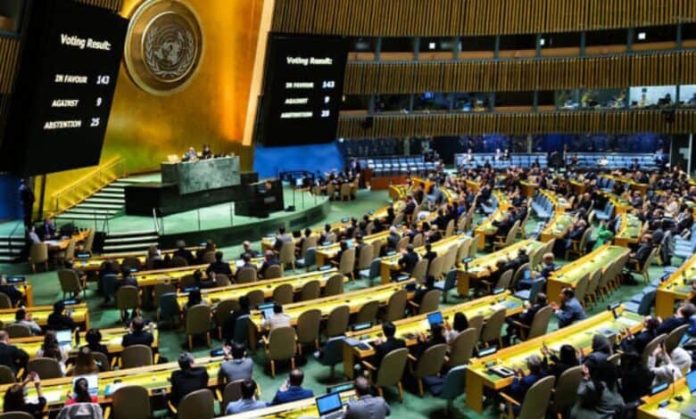The United Nations General Assembly has convened a high-level two-day conference aimed at reviving the long-stalled Israel-Palestine peace process through the framework of a two-state solution. The meeting, co-chaired by the foreign ministers of France and Saudi Arabia, began Monday, despite a boycott by Israel and its key ally, the United States.
Both Israel and the US have dismissed the event, with Washington labelling it “counterproductive” to its Gaza ceasefire efforts, and Israel’s right-wing government outright rejecting the two-state solution.
French Foreign Minister Jean-Noel Barrot emphasized the urgency of restarting political dialogue. “The two-state solution is more threatened today than ever before,” he stated during a CBS News interview. The meeting, originally scheduled for June, was delayed due to escalating regional tensions including Israel’s 12-day war with Iran and the ongoing war in Gaza.
The concept of a two-state solution dates back to the 1947 UN partition plan, which proposed dividing the British Mandate of Palestine into Jewish and Arab states. Israel accepted the plan, but it was never implemented due to the subsequent Arab-Israeli war. Since the 1990s, peace talks have centered on the creation of an independent Palestinian state based on pre-1967 borders, encompassing the West Bank, East Jerusalem, and Gaza — territories occupied by Israel in the 1967 war. Supporters argue that such a solution ensures both Israel’s democratic Jewish identity and Palestinians’ right to self-determination.
France and Saudi Arabia said the aim of the conference is to outline a clear roadmap to peace and urge all relevant actors to commit to time-bound, concrete steps toward implementing the two-state solution. Saudi diplomat Manal Radwan emphasized that the meeting should focus on action, not just dialogue.
French President Emmanuel Macron, ahead of the conference, announced that France will officially recognize the State of Palestine at the UN General Assembly’s annual meeting in September — making it the most prominent Western nation to do so. About 145 countries have already recognized Palestinian statehood.
Israeli Prime Minister Benjamin Netanyahu remains firmly opposed to the two-state solution, citing security concerns and nationalistic sentiment. Netanyahu argues that the West Bank is historically Jewish land and that Palestinians have demonstrated unwillingness to pursue peace, referencing the Second Intifada and Hamas’ takeover of Gaza after Israel’s 2005 withdrawal. Netanyahu condemned Macron’s announcement, claiming it “rewards terror and risks creating another Iranian proxy, just as Gaza became.”
Palestinians have long accused Israel of sabotaging peace efforts through settlement expansions and annexation threats. PLO Executive Committee member Ahmed Majdalani said the UN gathering will help prepare for a possible presidential summit in September, either in France or on the sidelines of the UN General Assembly. He added that Palestinians seek a credible international political process to establish a sovereign state, formal recognition from key nations like the UK, financial and humanitarian support for the Palestinian Authority, and reconstruction aid for war-torn Gaza.
All 193 UN member states were invited, and around 40 ministers are expected to attend. However, without the participation of Israel and the US, major breakthroughs are unlikely. The co-chairs have circulated an outcome document that may be adopted, and additional recognitions of Palestine may be announced.
UN Secretary-General Antonio Guterres called on the international community to not only support but create real conditions for a two-state solution, where both Israel and Palestine can exist peacefully side by side.




